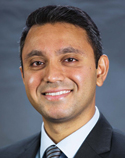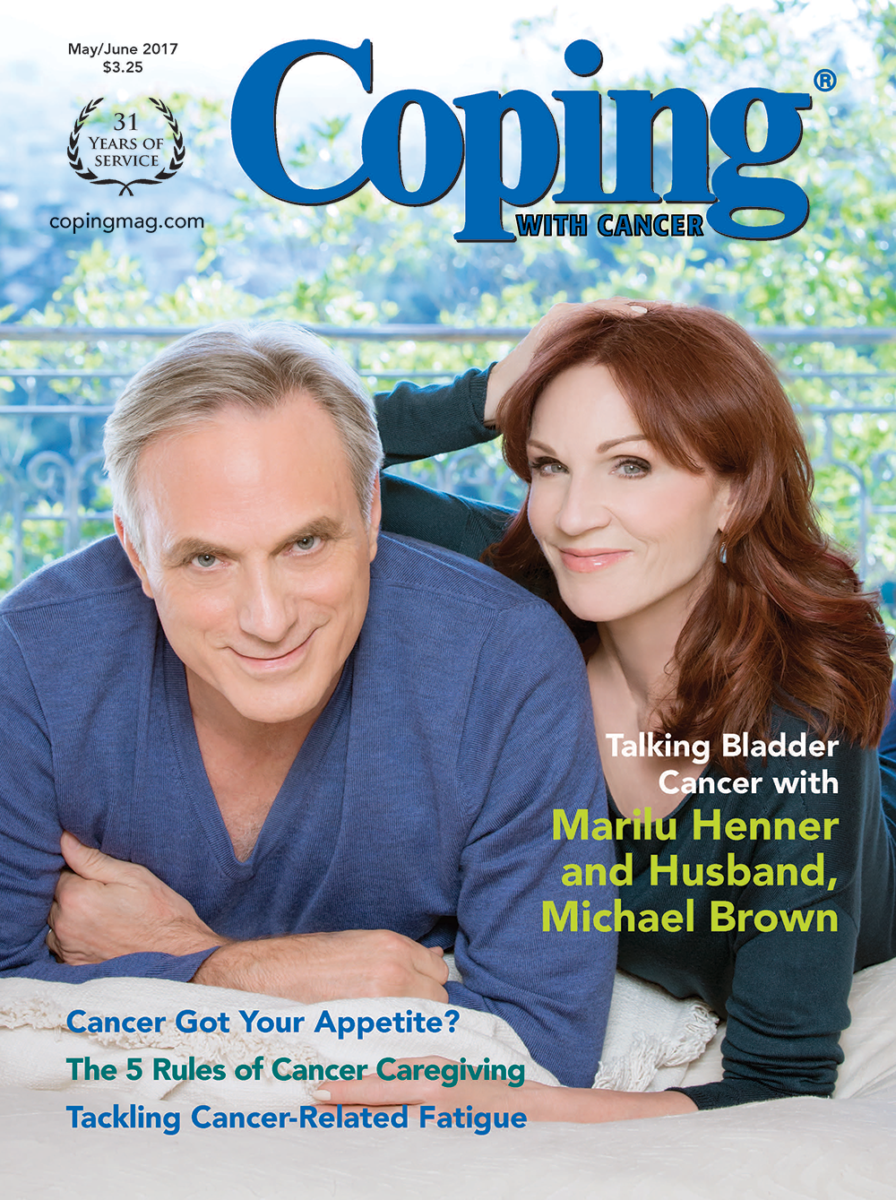Talking Bladder Cancer with Marilu
Marilu Henner and Husband, Michael Brown, Open Up about His Bladder
Cancer, Her Role as Caregiver, & How to Talk Frankly about the Disease
by Kaylene Chadwell
Best known for her role as Elaine Nardo in the 1970s sitcom Taxi, five-time Golden Globe nominee Marilu Henner has an extensive resume. In addition to television, she’s starred on Broadway and in film, is a New York Times bestselling author, has hosted her own radio show, and has even competed on reality TV. Most recently, she paired up with professional ballroom dancer Derek Hough to compete on the 23rd season of Dancing with the Stars.
If you watched her on DWTS last fall, you may have noticed one smiling, awestruck face in the crowd cheering her on through every step of every dance. That was her real-life partner, Michael Brown. And theirs is a love story fit for a romance novel. In fact, they did write a book about it, Changing Normal: How I Helped My Husband Beat Cancer.
Marilu and Michael were college friends. He dated her roommate, and she harbored a secret crush. After graduation, they lost touch. She became the Marilu Henner we know and love, and he traveled the world as a merchant mariner. But, fourteen years ago, they reconnected. And they wasted no time starting a life together.
Two months into their relationship, they were thrown the ultimate curveball when Michael was diagnosed with bladder cancer and then early-stage lung cancer. While lying in a hospital bed following lung surgery, Michael proposed. And in December 2006, he and Marilu tied the knot. He beat cancer. And they’ve been going strong ever since.
Now, Michael and Marilu have teamed up with Genentech to talk about how bladder cancer survivors can navigate difficult discussions with their partner, loved ones, and doctors. The couple recently shared with Coping how they took on cancer – together.
I am grateful for Marilu’s support as my own personal ‘health concierge.’ She made all of the challenges easier.
Michael
Coping: Michael, what’s been one of the more difficult challenges you’ve faced during your cancer experience?
Michael: You instinctively think, “This is a death sentence,” but as long as you put one foot in front of the other, gather a support team, and gather people who believe in you and your journey and understand it’s a fluid situation, then the whole time you’ll feel stronger. I am grateful for Marilu’s support as my own personal “health concierge.” She made all of the challenges easier.
Coping: Bladder cancer has a huge impact on quality of life. Marilu, how did you bring up those issues with Michael’s doctors?
Marilu: A recent survey by Genentech found that 67 percent of people think that bladder cancer treatment will create a burden on others. But open discussion can certainly ease that. I’m kind of a fearless communicator, so I brought up anything. You’re at the start of a journey. You don’t know what’s going to happen. But I felt undaunted by the information I was hearing. Let’s put it this way, the first day is the worst day. And that’s when the patient, all the blood is rushing to their head. They don’t know how to think. So, somebody has to be on top of the situation when you’re in the office with the doctor hearing the pathology report. And you want to put everything down on paper. Do whatever you have to do so that when the patient clears their head a little bit, they can hear or see exactly what the doctor said, so there’s no gray area.
Most of all, use humor. Because humor will get you through so much.
Marilu
Coping: How has cancer changed your life, Michael? And your relationship with Marilu?
Michael: Having cancer was certainly a difficult and uncomfortable time of my life. But while it was hard on my body, it strengthened my relationship with Marilu. We had very open, honest conversations – right from the initial diagnosis all the way through deciding what treatment option would be best for us.
Coping: As a caregiver, Marilu, what would you tell other caregivers about how they can help a cancer survivor manage their disease?
Marilu: Being a caregiver is not only being someone who can be there for them, but also be a liaison between the patient and the doctor. You have to go above and beyond just being the nice caregiver and listening. It’s a more active role than that. You have to be the one prompting the discussions, and also the one taking notes. And taking care of yourself so that you can be strong for the patient. And most of all, use humor. Because humor will get you through so much. The intimacy and the closeness that you might feel with your partner is going to make all the difference in the world. Because it’s hard. It’s a hard job. But it’s so rewarding, and you feel so good the more you can help someone that you really love.
Coping: What advice would you give someone whose loved one was just diagnosed with cancer?
Marilu: Understand that you’re in this together, and that no two situations are exactly alike, so it’s not a cookie-cutter thing. If someone is giving you advice that doesn’t sit well with you, see if there’s something else that does. Read as much as you possibly can. Ask as many questions as you can. Don’t give up. You can’t be afraid to ask the tough questions.
Coping: Michael, what does life after cancer and being a survivor mean to you personally?
Michael: As a cancer survivor, I’m so glad to now have the opportunity to partner with Genentech to share my story during Bladder Cancer Awareness Month. I know first-hand how important it is to be open and honest about bladder cancer, so Marilu and I want to help people have these tough talks about the disease. That’s why we developed a discussion guide to help jumpstart some of those hard conversations. You can find that on the Bladder Cancer Advocacy Network website BCAN.org.
A Doctor’s Perspective – Advice on Talking to Your Doctor about Bladder Cancer

Some people find it difficult to talk about bladder issues, even with their doctors. So, we asked Dr. Arjun Balar, a medical oncologist at NYU Langone Medical Center in New York, NY, who specializes in genitourinary cancer (like bladder cancer), what he thinks bladder cancer survivors and caregivers should know about discussing this disease with their doctors.
COPING: What role do you see for survivors and their caregivers as part of the team that makes decisions about treatment?
Dr. Balar: Patients and caregivers both play a critical role in helping to make treatment decisions. I encourage all of my patients to have open and honest conversations with their families about their thoughts, concerns, and preferences about treatment. Patients and their caregivers should feel comfortable asking their doctor to review all available treatment options and the impact each treatment may have on the patient’s life. This open conversation is particularly important because there have been significant advances in the treatment of bladder cancer in the last year, in particular, in the field of immunotherapy. In fact, within the last year, two immunotherapy agents were approved by the FDA for treatment of advanced bladder cancer after standard chemotherapy, and [just last] month, the FDA approved Tecentriq for advanced bladder cancer as first-line treatment, specifically for patients not eligible for cisplatin chemotherapy, which is a standard treatment. This is the first-ever treatment to be approved for this particular group of patients who are often too sick to receive aggressive chemotherapy.
COPING: What advice would you offer to patients who are either reluctant to speak with their doctors or have doctors who do not inquire about the impact of their treatment?
Dr. Balar: For patients who are reluctant to speak with their doctors, it can help to talk to someone who understands what it is like to fight bladder cancer. Many of my patients have found it especially helpful to talk to survivors who were diagnosed with the same stage cancer, as they will have faced similar treatment choices and, therefore, understand the specific questions and challenges you have. Your doctor can connect you with someone, or you can reach out to the Bladder Cancer Advocacy Network at BCAN.org. I encourage patients to ask those tough questions to their doctor so they can understand what may lie ahead. I always appreciate when a patient or their caregiver contacts me with questions in advance. It gives them time to consider all available treatment options, including clinical trials, so the patient is informed about their decisions.

Marilu Henner and Michael Brown’s book Changing Normal is an intimate account of how they stood together in the face of cancer. You can keep up with Marilu by following her on Twitter @TheRealMarilu.
May is Bladder Cancer Awareness Month. Marilu Henner and Michael Brown are working with Genentech to raise awareness about how bladder cancer survivors can navigate difficult discussions with their partner, loved ones, and doctors. Learn more at BCAN.org.
This article was published in Coping® with Cancer magazine, May/June 2017.


